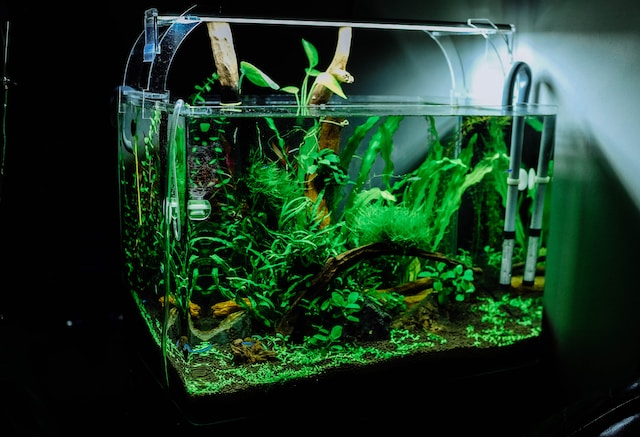Table of Contents
If you’re considering getting a betta fish, it’s important to know how long they can live in a 1 gallon tank. Betta fish, also known as Siamese fighting fish, are popular pets because of their vibrant colors and unique personalities. However, they require specific care to thrive, and tank size is a crucial factor to consider.
Betta fish can live up to 3 years in a 1 gallon tank, but this is not an ideal living situation for them. In the wild, betta fish live in shallow, warm waters, and they need plenty of space to swim and explore. A 1 gallon tank is simply too small to provide the necessary space and environmental stimulation for a betta fish to live a long and healthy life. In fact, keeping a betta fish in a tank that is too small can lead to a variety of health problems, including fin rot, stress, and even premature death.
Understanding Betta Fish
When it comes to keeping betta fish, it’s important to understand their nature and behavior. Betta fish, also known as Siamese fighting fish, are tropical fish that originate from Southeast Asia. These fish are known for their vibrant colors and long fins, which make them popular among aquarium enthusiasts.
Male bettas are more commonly kept than females, as they have more striking colors and longer fins. However, it’s important to note that male bettas are aggressive and territorial, which means they should not be kept with other male bettas or fish that have similar characteristics. Female bettas can be kept together in groups, but they can also display aggression towards each other.
Betta fish can live up to 3-5 years in optimal conditions. However, their lifespan can be significantly reduced if they are kept in a small tank, such as a 1 gallon tank. In a small tank, bettas may become stressed and exhibit aggressive behavior, which can lead to health issues and a shorter lifespan.
It’s important to provide betta fish with a tank that is at least 5 gallons in size. This will give them enough space to swim and explore, and will also help to reduce stress and aggression. Additionally, bettas require a heater to maintain a consistent water temperature of around 78-82°F, as they are tropical fish and cannot tolerate drastic temperature changes.
Betta Fish in a 1 Gallon Tank
If you are considering keeping a Betta fish in a 1 gallon tank, there are some important things you should know. While it is possible to keep a Betta fish in a 1 gallon tank, it is not an ideal environment for them to thrive.
Betta fish are active swimmers and need plenty of space to swim around. In a 1 gallon tank, they will have limited swimming space, which can lead to stress and boredom. Additionally, a 1 gallon tank can quickly become dirty and polluted, which can harm the health of your Betta fish.
If you do choose to keep a Betta fish in a 1 gallon tank, there are some things you can do to make the environment more suitable for them. First, make sure to clean the tank regularly to keep the water clean and free of harmful toxins. You should also consider adding a filter to the tank to help keep the water clean and oxygenated.
It is also important to provide your Betta fish with plenty of hiding places and decorations to explore. This will help keep them mentally stimulated and prevent boredom. However, be careful not to add too many decorations, as this can limit the already limited swimming space.
The Lifespan of Betta Fish
Betta fish are known for their vibrant colors and flowing fins, but how long do they actually live? The lifespan of betta fish can vary depending on a variety of factors, including their living conditions and overall health.
On average, betta fish can live anywhere from 2 to 5 years. However, some betta fish have been known to live up to 8 years with proper care. It’s important to note that betta fish lifespan can be affected by a variety of factors, including water quality, diet, and stress levels.
To ensure a healthy betta fish lifespan, it’s important to provide a clean and spacious environment. While betta fish can survive in a 1 gallon tank, it’s not recommended as it can lead to poor water quality and limited space for the fish to swim. A larger tank, ideally 5 gallons or more, can provide a more comfortable living space for your betta fish.
In addition to proper tank size, a healthy diet is also important for betta fish lifespan. A varied diet of high-quality betta pellets and occasional treats such as bloodworms or brine shrimp can keep your betta fish healthy and happy.
Stress can also play a role in betta fish lifespan. Avoid overcrowding and aggressive tank mates, and provide plenty of hiding places and decorations for your betta fish to explore.
Impact of Tank Size on Lifespan
The size of the tank is one of the most important factors that affects the lifespan of your betta fish. While your betta can technically survive in a 1-gallon tank, it is not recommended for long-term care. In fact, keeping your betta in a tank that is too small can lead to a number of health problems and ultimately shorten its lifespan.
A 1-gallon tank is simply not large enough to provide adequate swimming space for your betta. This can lead to stress and boredom, which can cause your betta to become lethargic and lose its appetite. Additionally, a small tank can quickly become dirty and polluted, which can lead to a buildup of harmful toxins that can be deadly to your fish.
If you want to ensure the longest possible lifespan for your betta, it is recommended that you keep it in a tank that is at least 5 gallons in size. A larger tank will provide your fish with more swimming space, which will help to keep it active and healthy. Additionally, a larger tank will be easier to maintain and keep clean, which will help to prevent the buildup of harmful toxins.
If you are interested in keeping multiple bettas, it is important to note that a 10-gallon tank is the minimum size recommended for a community tank. Additionally, if you are interested in keeping a betta sorority, it is recommended that you keep at least 5 female bettas in a tank that is at least 20 gallons in size.
Water Quality and Its Importance
Maintaining good water quality is crucial for the well-being and longevity of betta fish, especially in a 1-gallon tank. Poor water quality can lead to a host of health issues, including fin rot, fungal infections, and even death.
One of the most important factors in maintaining good water quality is performing regular water changes. In a 1-gallon tank, it is recommended to change 25-50% of the water every week. This will help remove excess waste and ammonia that can accumulate in the tank over time.
Ammonia is a toxic substance that is produced by fish waste and decomposing food. It can quickly build up in a small tank like a 1-gallon and cause harm to your betta. To combat this, you can use a water conditioner that neutralizes ammonia and detoxifies other harmful substances.
When performing water changes, it is important to use clean, conditioned tap water that is free from chlorine and other harmful chemicals. You can also use a water testing kit to monitor the levels of ammonia, nitrite, and nitrate in your tank.
Temperature Control in the Tank
Maintaining the right temperature in your betta fish’s tank is crucial to ensure their long and healthy life. Betta fish are tropical fish that require a water temperature between 76-82°F (24.5-28°C).
To keep the water at the right temperature, you will need to use a heater. A good quality heater will ensure that the water temperature remains stable, and your fish will not experience any sudden changes in temperature.
It is also important to avoid placing the tank in areas with drafts or direct sunlight. These can cause fluctuations in temperature, which can be harmful to your betta fish. Additionally, direct sunlight can cause algae growth in the tank, which can lead to poor water quality.
When it comes to lighting, betta fish do not require any special lighting. However, keeping the tank in a well-lit area can help regulate the water temperature. If you choose to use a light, make sure it is not too bright or too close to the tank, as this can cause the water temperature to rise.
Feeding Your Betta Fish
When it comes to feeding your betta fish, it is important to maintain a balanced and nutritious diet. Betta fish are carnivorous and require a diet that is high in protein. There are several options when it comes to feeding your betta fish, including pellets, live food, and frozen food.
Pellets are a popular option and are readily available in most pet stores. It is important to choose high-quality pellets that are specifically designed for betta fish. These pellets are formulated to provide all the necessary nutrients that your betta fish requires for optimal health.
In addition to pellets, you can also supplement your betta fish’s diet with live food such as brine shrimp and bloodworms. These foods provide a natural source of protein and are a great way to vary your betta fish’s diet. However, it is important to note that live food should be used sparingly and should not be the primary source of food as it can be expensive and can carry diseases.
It is also important to avoid overfeeding your betta fish. Overfeeding can lead to health problems such as constipation and bloating. A good rule of thumb is to feed your betta fish only what they can consume within 2-3 minutes, twice a day.
Aquarium Setup and Maintenance
When setting up a 1 gallon tank for your betta fish, it is important to ensure that the aquarium is properly set up and maintained to provide a comfortable and healthy environment for your fish to thrive in. Here are a few tips to help you set up and maintain your aquarium:
Aquarium Setup
- Choose a suitable aquarium: A 1 gallon tank is the minimum size recommended for a betta fish. Make sure the tank is made of glass or acrylic and has a lid to prevent your fish from jumping out.
- Add a substrate: Betta fish prefer a soft substrate such as sand or gravel. Rinse the substrate thoroughly before adding it to the tank to remove any debris or dust.
- Decorate the tank: Add plants, rocks, and other decorations to provide hiding places and create a natural environment for your fish.
- Install a filter and heater: A filter will help keep the water clean and a heater will maintain the water temperature at a suitable level for your fish.
Aquarium Maintenance
- Check the water temperature: Betta fish prefer a water temperature between 76°F and 82°F. Use a thermometer to monitor the water temperature and adjust the heater as necessary.
- Perform regular water changes: Betta fish produce a lot of waste, so it is important to perform partial water changes of 25% to 50% every week to keep the water clean and healthy.
- Clean the aquarium: Use an aquarium-safe cleaner to clean the glass and decorations. Avoid using soap or other household cleaners, as they can be toxic to your fish.
- Test the water: Use a water testing kit to monitor the levels of ammonia, nitrite, and nitrate in the water. These levels should be kept at a minimum to prevent harm to your fish.
By following these tips, you can ensure that your betta fish lives a long and healthy life in their 1 gallon tank.
Plants and Decorations in the Tank
When it comes to keeping betta fish in a 1-gallon tank, adding plants and decorations can have a positive impact on their well-being. Not only do they provide hiding places for your fish, but they also help to create a more natural environment that can reduce stress and improve their overall health.
One option for adding plants to your tank is to use live plants. These can help to oxygenate the water and provide a natural source of food for your fish. Some good options for live plants include Java moss, Anubias, and Marimo moss balls. However, it’s important to note that live plants require care and maintenance, such as regular pruning and fertilization.
If you don’t want to deal with the upkeep of live plants, artificial plants can also be a good option. These can provide a similar aesthetic without the added maintenance. When choosing artificial plants, make sure to look for ones that are made from non-toxic materials and won’t harm your fish.
In addition to plants, decorations can also be a great addition to your betta fish’s tank. Decorations such as caves, rocks, and driftwood can provide hiding places for your fish and help to create a more natural environment. When choosing decorations, make sure to avoid anything with sharp edges or small parts that your fish could get stuck in.
Filtration System for Betta Fish
When it comes to keeping betta fish in a 1 gallon tank, a filtration system is essential. Without proper filtration, the water can quickly become stagnant and polluted, which can be harmful to your fish’s health.
A filter helps to remove debris, excess food, and waste from the water, which can lead to a buildup of harmful bacteria. It also helps to oxygenate the water, which is essential for the health of your fish.
There are several types of filters available for betta fish tanks, including hang-on-back filters, sponge filters, and internal filters. Each type has its own pros and cons, so it’s important to choose the right one for your tank.
Hang-on-back filters are easy to install and maintain, and they provide excellent filtration and oxygenation. Sponge filters are also easy to maintain and are very effective at removing debris and waste from the water. Internal filters are a bit more complicated to install, but they are very efficient at filtering the water and providing oxygenation.
When choosing a filter for your betta fish tank, make sure to choose one that is appropriate for the size of your tank. A filter that is too small will not provide adequate filtration, while a filter that is too large can create too much water flow, which can be stressful for your fish.
Common Diseases and Health Issues
Betta fish are generally hardy and easy to care for, but they are still susceptible to a number of common diseases and health issues. Some of the most common issues you might encounter with a betta fish in a 1-gallon tank include fin rot, infections, and general lethargy.
Fin rot is a bacterial infection that can cause the fins of your betta fish to become ragged and discolored. If you notice this happening, it’s important to take action right away to prevent the infection from spreading. You can treat fin rot with antibiotics, but it’s also important to address any underlying issues that may be contributing to the problem, such as poor water quality or overcrowding.
Infections can also be a problem for betta fish, particularly if they are kept in a tank that is too small or has poor water quality. Symptoms of infection can include changes in behavior, such as lethargy or loss of appetite, as well as physical symptoms like redness or swelling. If you suspect your betta fish has an infection, it’s important to seek treatment right away to prevent the infection from spreading.
Finally, general lethargy or changes in behavior can be a sign of a larger health issue. If you notice your betta fish is not as active as usual, or is spending more time hiding or resting, it’s important to investigate the cause of this behavior. This could be due to a variety of factors, including poor water quality, stress, or illness.
Tips for Caring for Your Betta Fish
When it comes to caring for your betta fish, there are a few important tips to keep in mind. Proper care will help your fish live a long and healthy life. Here are some tips to help you care for your betta fish:
- Provide a suitable tank: Betta fish need a tank that is at least 2.5 gallons in size. A 1 gallon tank is not suitable for a betta fish as it does not provide enough space for exercise and swimming.
- Keep the water clean: Betta fish are sensitive to dirty water, so it’s important to keep their tank clean. Change the water in the tank once a week and use a water conditioner to remove any harmful chemicals.
- Provide hiding places: Betta fish need places to hide and rest. You can add plants, rocks, or decorations to the tank to provide hiding places for your fish.
- Avoid overfeeding: Overfeeding can lead to health problems for your betta fish. Feed your fish a small amount of food once or twice a day.
- Provide toys: Betta fish enjoy toys such as floating balls or mirrors. These toys can help provide exercise and mental stimulation for your fish.
- Minimize stress: Betta fish are sensitive to stress. Avoid sudden changes in temperature or water conditions, and keep the tank away from loud noises and bright lights.
By following these tips, you can provide proper care for your betta fish and help them live a long and healthy life.
Potential Tank Mates for Betta Fish
When it comes to keeping betta fish in a 1 gallon tank, it’s important to consider their tank mates. While betta fish can be kept alone, they can also thrive in community tanks with the right companions. Here are some potential tank mates for your betta fish:
Guppies
Guppies are a popular choice as tank mates for betta fish. They are peaceful and colorful, and can add some variety to your tank. Just make sure to choose male guppies, as female guppies can be aggressive towards betta fish.
Predators
Avoid adding any predators to your betta fish’s tank, as they can attack and harm your betta. This includes fish such as cichlids, angelfish, and tiger barbs.
Community Tank
If you want to create a community tank with your betta fish, consider adding peaceful fish such as neon tetras, corydoras, and gouramis. Just make sure to research the compatibility of each species before adding them to your tank.
Betta Sorority
If you have a larger tank, you can consider creating a betta sorority with multiple female betta fish. However, this should only be attempted by experienced fish keepers, as it requires careful planning and monitoring to ensure the safety and well-being of all fish involved.
Betta Fish in the Wild vs Captivity
Betta fish, also known as Siamese fighting fish, are native to the rice paddies, ponds, and slow-moving streams of Southeast Asia. In the wild, these fish have a lifespan of about 2-3 years. However, in captivity, they can live up to 5 years or more with proper care.
In the wild, betta fish have access to a larger living space, natural food sources, and a variety of hiding places. They are also exposed to various environmental factors such as temperature fluctuations, water quality changes, and predators. These factors can affect their lifespan and overall health.
On the other hand, betta fish in captivity are kept in smaller tanks or bowls, which can limit their movement and lead to stress and boredom. They are also fed a diet of commercially available fish food, which may not provide all the necessary nutrients for their optimal health.
To maximize the lifespan of a betta fish in captivity, it is essential to provide them with a suitable environment, including a tank of at least 5 gallons, a heater to maintain a consistent temperature, and a filter to keep the water clean. Additionally, a varied diet that includes live or frozen food can help ensure their nutritional needs are met.
Overall, while betta fish can live longer in captivity with proper care, it is important to remember that they are still living beings that require a suitable environment and adequate care to thrive.







